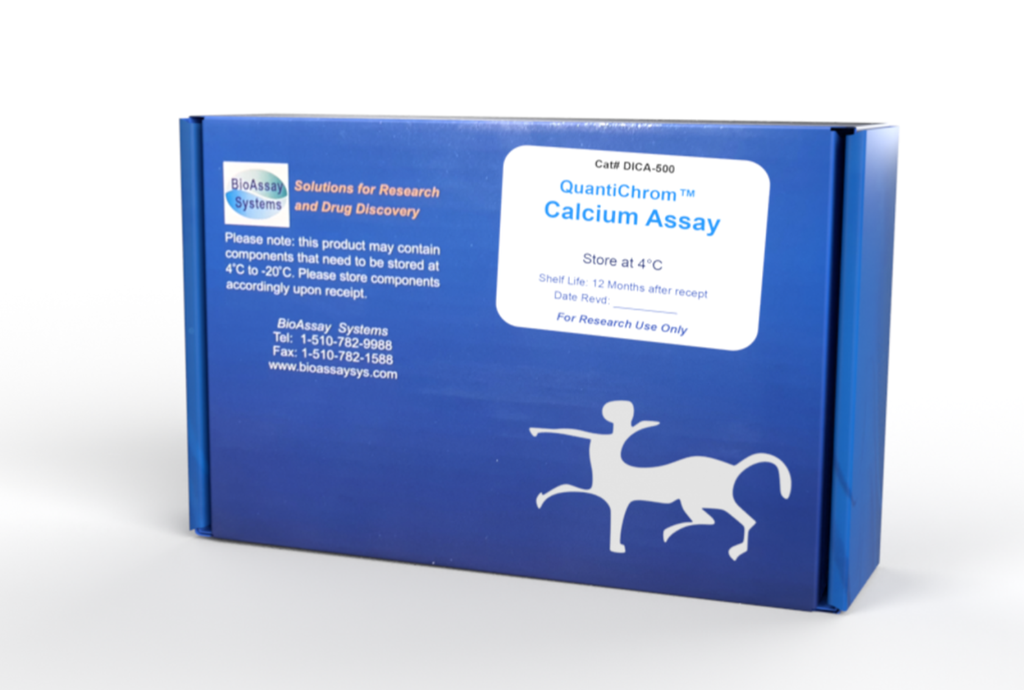DESCRIPTION
CALCIUM is measured to monitor diseases of the bone or calcium regulation disorders. Increased calcium levels in serum are reported in hyperparathyroidism, metastatic bone lesions and hypervitaminosis, while decreased levels are observed in hypoparathyroidism, nephrosis, rickets, steatorrhea, nephritis and calcium-losing syndromes. Urinary calcium levels aid the clinician in understanding how the kidneys handle calcium in certain diseases of the parathyroid gland. Urinary calcium levels are also essential in the medical evaluation of kidney stones.
Simple, direct and automation-ready procedures for measuring calcium concentration in biological samples are becoming popular in Research and Drug Discovery. BioAssay Systems' calcium assay kit is designed to measure calcium directly in biological samples without any pretreatment. A phenolsulphonephthalein dye in the kit forms a very stable blue colored complex specifically with free calcium. The intensity of the color, measured at 612 nm, is directly proportional to the calcium concentration in the sample. The optimized formulation minimizes any interference by substances such as magnesium, lipid, protein and bilirubin.
KEY FEATURES
Sensitive and accurate. Use as little as 5 µL samples. Linear detection range 0.08 mg/dL (20µM) to 20 mg/dL (5mM) Ca2+ in 96-well plate assay.
Simple and high-throughput. The procedure involves addition of a single working reagent and incubation for 3 min. Can be readily automated as a high-throughput assay for thousands of samples per day.
Improved reagent stability and versatility. The optimized formulation has greatly enhanced reagent and signal stability. Cuvet or 96-well plate assay.
Low interference in biological samples. No pretreatments are needed. Assays can be directly performed on raw biological samples i.e., in the presence of lipid, protein and minerals such as magnesium, iron and zinc.
APPLICATIONS
Direct Assays: Ca2+ in blood, urine, saliva etc.
Drug Discovery/Pharmacology: effects of drugs on calcium metabolism.
Food and Beverages: calcium determination.
Environment: calcium determination in water and soil.
KIT CONTENTS (500 tests in 96-well plates)
Reagent A: 50 mL Reagent B: 50 mL Calcium Standard: 1 mL 20 mg/dL Ca2+
Storage conditions. The kit is shipped at room temperature. Store Reagent and Standard at 4°C. Shelf life: 12 months after receipt.
Precautions: reagents are for research use only. Normal precautions for laboratory reagents should be exercised while using the reagents. Please refer to Material Safety Data Sheet for detailed information.
PROCEDURES
Matrix in certain samples (e.g. whole blood) may interfere with the assay. For internal standard protocols, please see "Product FAQ" for this product at www.bioassaysys.com.
Procedure using 96-well plate:
1. Dilute standards as follows. Transfer 5 µL diluted standards and samples into wells of a clear bottom 96-well plate. Store diluted standards at 4°C for future use.
2. Prepare enough working reagent by combining equal volumes of Reagent A and B. Add 200 µL working reagent and tap lightly to mix.
3. Incubate 3 min at room temperature and read optical density at 570- 650nm (peak absorbance at 612nm).
Procedure using cuvette:
1. Set up test tubes for diluted standards and Samples. Transfer 15 µL diluted Standards and samples to appropriately labeled tubes.
2. Add 1000 µL working reagent and vortex to mix. Incubate 3 min. Transfer to cuvet and read optical density at 612nm.
CALCULATION
Subtract blank OD (water, #8) from the standard OD values and plot the OD against Ca2+ standard concentrations. Determine the slope using linear regression fitting. Calcium concentration of the sample is calculated as
ODSAMPLE and ODBLANK are OD612nm values of sample and sample blank (water or buffer in which the sample was diluted).
Conversions: 1 mg/dL Ca2+ equals 250 µM, 0.001% or 10 ppm.
MATERIALS REQUIRED, BUT NOT PROVIDED
Pipeting devices and accessories (e.g. 5 µL).
Procedure using 96-well plate:
Clear bottom 96-well plates (e.g. Corning Costar) and plate reader.
Procedure using cuvette:
Cuvets and Spectrophotometer for measuring OD612nm.
GENERAL CONSIDERATIONS
EDTA and other Ca2+ chelators interfere with this assay. This assay can not be applied to plasma samples obtained with EDTA.
EXAMPLES
Samples were assayed in duplicate using the 96-well plate protocol. The Ca2+ values (mg/dL) were 8.5 ± 0.4 (rat serum), 6.5 ± 0.3 (human serum), 7.6 ± 0.1 (goat serum), 11.1 ± 1.0 (Invitrogen fetal bovine serum), 2.5 ± 0.4 (fresh human urine), 41.3 ± 0.5 (Kirkland 2% reduced fat milk), 5.0 ± 0.0 (tap water, Hayward, CA), 0.86 ± 0.07 (tap water, San Bruno, CA), 1.8 ± 0.1 (Crystal Geyser natural alpine spring water), 2.3 ± 0.1 (Coca-cola® classic coke), 0.04 ± 0.01 (Lipton Lemon iced tea), 0.52 ± 0.07 (soil extract. 5.6 g of Hayward, CA soil was extracted with 10 mL MilliQ water. The supernatant was centrifuged to remove any insoluble particles. Clear supernatant was assayed).
PUBLICATIONS
1. Luong, T. T. D., et al (2021). Acid sphingomyelinase promotes SGK1-dependent vascular calcification. Clinical Science (London, England: 1979), 135(3), 515-534.
2. Xu, T.-H., et al. (2020). OGT knockdown counteracts high phosphate-induced vascular calcification in chronic kidney disease through autophagy activation by downregulating YAP. Life Sciences, 261, 118121.
3. Su, Z., et al. (2020). Celastrol attenuates arterial and valvular
calcification via inhibiting BMP2/Smad1/5 signalling. Journal of
Cellular and Molecular Medicine, 24(21), 12476-12490.
